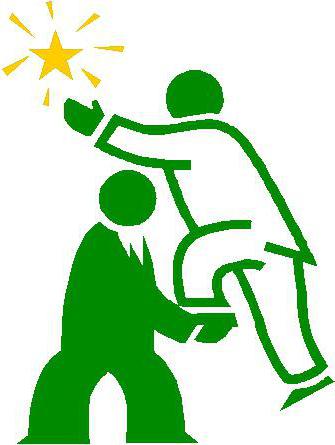Almost every person has the resources with which he can achieve any goals and fulfill his wildest dreams. But often they are hidden, and not everyone can find them in themselves independently. Stereotypes, fears, habits, negative experience and, as a result, self-doubt prevent this.
When a person feels that he still can’t live, that the time has come to fundamentally change something, but does not know how to do it, he resorts to help with a special type of psychological counseling called “coaching”. What it is?

Who is a coach
From English, “coach” is translated as “mentor”, “coach”, that is, a person who leads to the achievement of the planned result. As a rule, this is a professional psychologist, which just helps to find people who turned to him with their hidden reserves. And having found them, he leads the client to the goal set by himself. After all, the coach’s task is not to impose his ideas and not to offer his own way out of this situation, but to create psychological conditions so that a person can do it on his own. For this, the specialist helps to see the situation as if from the outside, verbally formulate goals and desires, and to do this clearly enough so that the person himself understands what he really wants. And only after that you can begin the path to achieving them.

A coach is essentially not a mentor, but an attentive interlocutor. After all, he does not teach and does not give any advice. What a professional psychologist-coach gives the client is much more than just psychological training. This is coaching. What is this, we will try to tell in this article.
What is coaching?
In the process of counseling, a professional coach asks the client such “right” questions, thanks to which a person begins to realize the essence and depth of the situation. After this “insight”, he already becomes able to find the most optimal paths to a clearly formulated goal. This is precisely the essence of the process called “coaching”. What it is? In simple words, you can describe it as a professional counseling method that helps your client clearly outline his intention and outline ways to achieve it.

Thus, even the most insecure person who is at a crossroads in life will be able to make the most correct decision and develop a behavior strategy that allows him to act effectively and flexibly in the current situation.
The peculiarity of coaching is that it does not impose a ready-made solution on the client, but helps a person develop his own style of effectiveness. Coaching as a type of psychological training is based on the psychology of success and optimism. After working with a coach, clients begin to realize that now they already have enough potential to achieve their goals and solve vital issues.
Working with a coach involves new positive changes in the life and work of the person who turned to him for help. The effectiveness of this type of psychological counseling is expressed in the concrete results achieved after a joint study of the problem.
Etymology of the words "coach", "coaching"
Now consider what the word "coaching" means, what it is from the point of view of linguistics.
The term this English, in translation means “to instruct”, “to teach”, “to inspire” or “to train”.
In the XVI century, “coach” was called ... a cart or carriage. In a closer sense to the real meaning of the word, it was first used at the University of Oxford in 1830. Then, a “coach” in youth slang was called a person who helped the student in preparation for the exam.
It would seem that in common between a freight vehicle and a tutor? However, such a commonality with careful analysis can be traced: he and the other endure something. The first - cargo to the destination, the second - the student to a new level of knowledge. In the modern sense, the “coach” also takes people to where they want to be, to the new reality that they are striving for. That is, the coach is the one who delivers his client to the goal, helps him move forward.
From the history of coaching
Initially, coaching began to practice in the field of sports psychology. In the 90s of the XIX century, the word "coach" entered the vocabulary as the name of a trainer for athletes. Then they began to call any mentor or instructor. Coaching as a form of psychological assistance arose at the intersection of psychotherapy, mentoring and sports coaching. Gradually, this type of activity developed into coaching to achieve results in life.
In 2001, in the United States, the profession of coach was officially recognized. In our time, the direction continues to improve and develop, finds new areas of application. In developed countries, the position of a coach-coach is officially provided for in the staffing table of almost every enterprise. At least in those led by visionary people. After all, the cost of maintaining such a specialist pays off handsomely.
The difference between coaching and conventional psychological counseling
On the part of coaching and psychological counseling are very similar: a specialist talks with a client, helping him in solving problems. But essentially these are completely different types of psychological assistance.
If counseling is aimed at solving a specific problem, for which a psychologist refers to the past of the client, then the coach’s questions are directed to the future - coaching is focused primarily on the goal, which is formulated only on the positive, it is strictly forbidden to talk about problems. That is, instead of discussing what the client does not want, they talk about what he is striving for. A coach helps a person who has desires and dreams to realize them and make them more specific, clear.
Among the tasks of this special type of psychological training, it is possible to single out such as helping the client to accept himself, creating attitudes and values. Coaching is also intended to teach the client to understand himself, to believe in himself, to trust others. All this will help a person to find ways to effectively solve the tasks.
It only at first glance seems that the psychologist is just talking to the client. In fact, he does a great job using his professional knowledge, life baggage, as well as special methods and techniques.

Coaching methods
When working with a client, the coach uses various psychological methods, which depend both on the goals set and on the professionalism of the mentor himself. Among them:
• active listening;
• a method for raising strong questions;
• psychology of conflict resolution;
• stress management;
• brainstorming method;
• methods of building and managing a team;
• technologies for effective personnel management;
• coach sessions (individual and group);
• training in effective communication skills.
Coach tools can also be questionnaires, projective techniques, elements of deep psychology, and many others.
Coaching techniques
A professional coach uses various techniques in working with clients that contribute to the person’s effective achievement of his goals. Among them:
- suggestive rephrasing;
- hearing;
- refinement that helps the client to see new means of achieving his goal.
These coaching techniques help people achieve success, having risen above themselves today, they help clients in different areas. They are used in almost any kind of coaching.

Types of coaching, their features
According to the number of clients the specialist works with simultaneously, individual and group coaching are distinguished.
Now there are about five hundred types of such training: from VIP-coaching to social work. It is developing in the following areas:
• personal coaching;
• business coaching;
• academic;
• financial;
• Healthy lifestyle coaching, which helps clients with chronic or incurable diseases learn how to live with them.
In America, there are even trainings for housewives and pregnant women.
Let us dwell on some types.
Personal coaching
Personal or individual coaching includes several types, among which life-coaching and coaching for people with attention deficit. What is their essence?

Life coaching is designed to help the client concretize their own aspirations and desires, to set personal goals.
A special type of personal coaching is helping people with attention deficit disorder. Its purpose is to reduce the influence of the dysfunction of purposeful activity. A specialist helps such people organize for setting and achieving goals. It is very important in this type of training to help clients identify their strengths.
Of course, coaches are not doctors, they don’t treat people with attention deficit disorder who come to them, but only help them simplify their daily lives.
Business coaching and financial coaching
The purpose of business coaching is to improve the performance of an institution or enterprise. Coaches help clients achieve professional goals, work on improving communication skills, and effective conflict resolution. The help of professionals is also essential in creating a single team that is able to work together in a productive manner due to the fact that goals - personal and corporate - become more conscious, a creative atmosphere is created in the team, and the labor potential of employees is used as efficiently as possible. This type of coaching helps identify leaders in the team, and also enables management to motivate subordinates with intangible incentives. After psychological training, people begin to work with great interest, and the return on such work becomes higher.

A relatively new form of such activity is financial coaching. What are you talking about? The coaching program is designed to help the client overcome psychological obstacles to achieving financial goals. Such a coach helps the client to form the right attitude towards money.
Academic coaching
Helps to acquire skills for successful learning. This is a special coaching: training after it becomes more productive due to the fact that the client's attitude to learning in general changes. The specialist is not a tutor in any particular subject, but works specifically with the attitude to the process of obtaining knowledge. After such a study, students reveal their potential and begin to achieve high results. Coaching helps to shape the desire for self-development, as well as to build the learning process taking into account the individual personality qualities of a particular person. This kind of coaching training makes you conscious and enjoyable.
So to summarize. One of the methods of psychological counseling is coaching. What this is, in simple words can be explained as follows: this is the creation by the coach in the course of working with the client of such conditions under which he independently finds ways to achieve his own goals, having previously clearly formulated them. And forward - to new victories in life!